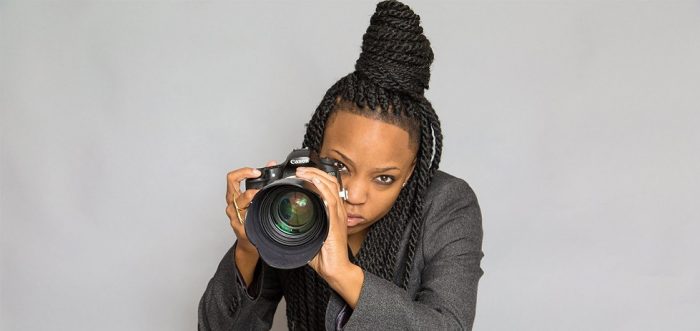A look at the internal homophobia and gender policing that quietly rives the black lesbian community in the U.S., Nneka Onuorah’s debut feature The Same Difference brings these prejudices under a spotlight. We caught up with Onuorah during the Queer Screen Mardi Gras Film Festival, where The Same Difference made its international debut.
How are you finding the response to your film? Obviously you’re out here in Australia – what’s it like getting to take your film to such a different context to the one in which you made it?
The reception in Australia is amazing for the film. People have been coming up to me – I went to Fair Day and people were coming up to me to tell me how much they enjoyed the film, so the reception has been great here in Australia. It’s funny cos I didn’t really think about what the difference would be between an American audience, which I’ve done – all American shows and this is my first international show – but it was quite interesting. The same reactions happened here in Australia. It was good to know that people in Australia somewhat related to what was going on in the film.
To start with the kind of mechanics of it, although there’s obviously strong audience interest but I read that you had a kickstarter that didn’t get off the ground. How did you find getting funding and support?
[Laughs] That was my least favourite part, getting funding and support. I’m not a person that likes to ask for things and obviously every filmmaker they have to go out and get funding. I tried the kickstarter, but it takes a lot from me to ask for stuff so it didn’t go too well. I didn’t reach my goal but I continued to pursue it anyway. I just used my own money to finish the film. The fundraising process is the most horrible process. Next time for my next film, I’ll be ready for it but this first film I did out of pocket.
I was just talking to Emma [from MGFF] about the production masterclass you did. Did you tell people that in the class, that it’s really hard to ask people for the funding you want? What would you tell other people about that?
I would say that relationships are important when you’re a filmmaker. Your relationship to the audience is important, your relationships to organizations that give to filmmakers are very important and the way you manage your production budget is very important. In the class I moreso talked about how to structure your ideas, how to get them started, cos people have an issue starting stuff. You know, they have the idea in their head but they never start it, or they have the idea in their head but if they can’t see it from point A to point B before they start, they just say forget about. So my master class was about taking peoples ideas and making them workable, making them be able to walk out of the room and start making their own films.
Right, so like step-by-step.
Yeah.
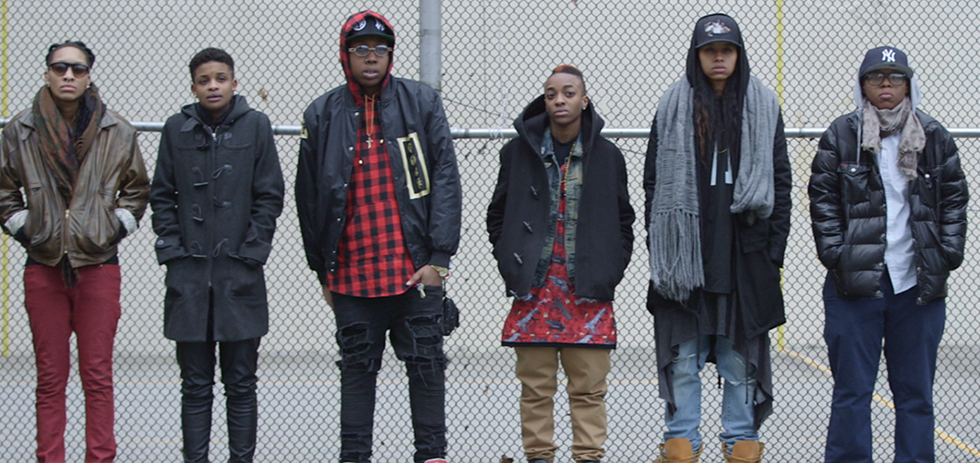
I was particularly struck by how many people you had in your film, how many people were willing to talk. Did you find the community was receptive while you were making it? Did it change afterwards?
The community was very receptive in my making of the film. We were very collaborative. It was beautiful to see people pass on the word that I was trying to find people for the film and people shared it on their social media platforms. It’s really a collaborative effort, this film. It’s really community-heavy and based. Their support means the world and they’ve supported the film numerous times – 25 times at this point. It was beautiful getting that support from my sisters and other people, part of the LGBT community, and not part of the LGBT community, our allies. The reception of people interviewing was a little bit more difficult because people were nervous about the ridicule they receive for the type of relationships they’re in, or how they chose to present. They were kinda afraid of how people were gonna react. Even after people shot and they were fine with it, when it was time for the movie to come out people started changing their minds after it was out.
Really? Did you lose people, you know, people said, ‘I don’t want my footage in the film’?
No, they didn’t say that… but you know when you reach out and people are really excited and interested and you know when they’re kinda shying away. But there’s no one that’s told us that.
On that note, in the film you had not just people who had been discriminated against and harmed by these internal prejudices, but also you had people who were actually doing that discriminating, and who still agreed to be in the film. Like the phone call with Jordan [Diaz, the ‘pregnant stud’ in the film], and the person who has been talking really harmful things about her online, and the scene where there is a coming-in party to date a guy. Were people comfortable being on screen and saying, yeah I discriminate on the basis of this?
They were, you know, they were comfortable saying how they really felt. They held no punches! They just said exactly how they felt. We had sometimes in interviews, they tried to make it the opposite of what they really felt, and I was like, no! It’s okay to say how you really feel here. And then they would say how they felt. Cos a lot of people, they’ll say it in in the real world, but once they’re on camera and people are judging them, they shy away from how they feel, or they don’t want to offend.
Yeah, understandable. I was also wondering, you chose not to have your own voice, or your own image, onscreen in the film. What was the reasoning behind that?
I wanted to give other people a platform, and I just wanted to focus solely on directing for the first time. I didn’t really wanna have to have the pressure of being in the film and behind the scenes and obviously other people have stories that are a lot more difficult than what I grew up with, and I wanted to have those stories. Also like, I feel like people can feel my spirit through the film. People who know me personally, when they watch it they tell me, ‘wow, this film has so much of your spirit inside of it.’ You know, the resilience and the sticking up for what I believe in. King Kellz, who was the exotic dancer in the film, she embodies my struggle personally. That’s why I put her in so much as a character. I guess I was so driven by her cos, you know, she wears extensions in her hair, I have extensions in my hair as well and I dealt with people saying stuff like that as I grew up. But I was really tough so I would just say something back, or I just wouldn’t care. And Kellz has a lot of that as well – no matter what comes her way she always stands strong, and firm. So Kellz kinda expresses what I wanna express without me being a part of the film. And then Snoop’s charisma – her charisma and her humour towards it, you know what I’m saying. A lot of people laugh a lot when they watch the film as well cos there’s some entertaining parts of it, and you kind of get me through the spirit of the film.
Was it hard to be in that kind of a dual role as both filmmaker and a community member? I definitely got the sense watching it, when you say that your spirit was in it, I definitely got the sense that no outsider could come in and tell these stories compassionately, successfully, get people to want to talk – but I was wondering if it was hard to be in both those roles at the same time.
It is difficult to be in both roles at the same time. Number one, because really on the outside people see me as a lesbian, then they see me as a filmmaker, and so when you have to go try and sell this film to networks and they’re like, ‘why should we care about the African American lesbian community? Why would people want to watch this?’ And its like, you’re talking to a lesbian who’s African American. So it becomes activism. It started off as a film, but now I feel the need to fight every day to prove that our voices are viable, just like everyone else’s; that our stories are important; and that there’s so many different types of women in the spectrum that we shouldn’t be boxed in as the minority lesbians. Like, no! We’re women, period point blank. All of us as humans have similarities, all of us have differences, at the end of the day we all want the same things and so it’s the hardest when you’re trying to sell it to people and if they don’t receive you, they’re directly offending you.
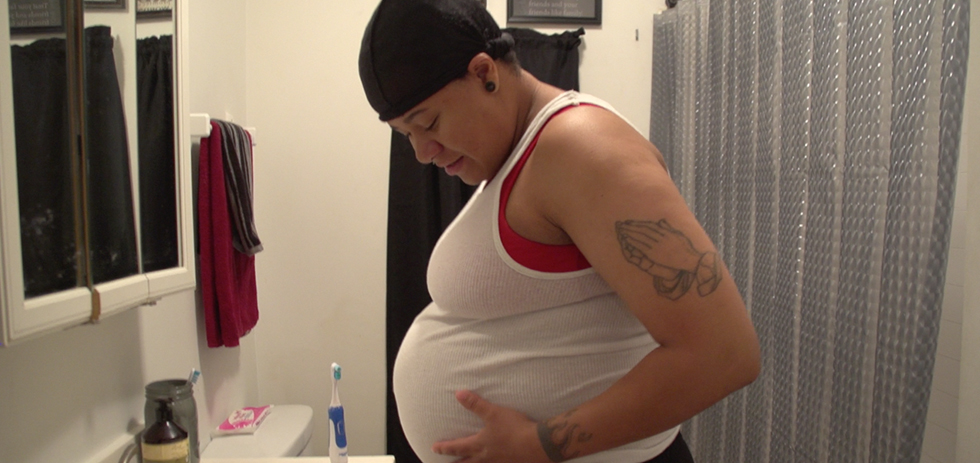 There’s a lot invested in it.
There’s a lot invested in it.
Right, and there could be no one better for the job than me, cos I’m willing to fight, I’m a fighter. That’s the hardest part, really. Not really for in the community, but just outside.
Once you take it outside.
Yeah, it’s like, you see how the world at large really feels about number one, women; number two, lesbians; number three, African Americans. There’s so many struggles that they just become evident. So I’ve learned a lot about the world creating this film.
With the format of the film, I really liked how you had the rules to structure it. Why’d you do that?
Because it’s like, when I was doing the interview with the poet, she was talking about how there was a silent disciplining, these unspoken rules that we had that no one ever talked about, so I wanted to kinda give them a face, in a way, so that people can see what they’re basically creating. To kinda make it… it’s almost humorous in a sense. We have all these ridiculous rules that box each other in but until you see them right in front of your face, you might not notice that you’re even contributing to this structure. Everyone has rules, and there’s this rulebook, so I wanted to bring the rulebook to life. And its so funny, I didn’t intend in the beginning when I was doing this film to add the rules. It was in the last minutes of the edit where I was like, how can I structure this to make sense? And then one day I just popped up, and I was like, we should get type-writer sounds and write out the rules so that people can see, and make the movie structure based on the rules.
It makes it really accessible, it kinda really clearly breaks it down – cos the roles and the positions and the relationships are incredibly complex within the community. In the film, it’s focussed particularly on masculinity, and the rules around masculinity. Why are masculine identities so much more fraught than feminine identities?
The masculine identity, I mean, you gotta think about the world. Men rule the world… they’re the ones seen as most powerful, they’re the ones who get the better jobs, they’re the ones who are seen as the providers, and so people associate masculinity with power. So people always feel like there’s this need to be masculine, like masculinity is this role of importance – it makes you better than everyone else, the harder you are the better. And I think that’s why I focussed moreso on that, cos I wanted people to see that femininity can be beautiful. It doesn’t have to mean that you’re weak because you’re feminine. Cos when you’re a stud, or an aggressive woman, and someone, one of your other stud or aggressive friends see you and you look a little bit more girly than you usually do, they’re like, ‘oh you’re acting like a femme.’ And then they’ll change to become more masculine so they’re not seen that way. So it’s never viewing it instead like, ‘oh, you’re like a femme today,’ in a nice way. It’s always in a derogatory way, so I think that’s why I wanted to focus on masculinity cos there’s where the issues lie. There’s where the world’s issues lie. Again, it’s a universal issue, its just being acted out through this particular community that no ones paying attention to. But if you actually pay attention to the community, it speaks to the entire world on where we stand and what we feel about femininity versus masculinity, and where we see the power lies. Even as women, a whole community of women seeing men as powerful – women who date women at that. It’s not supposed to be about that, you know, there is no man there, so why are we bringing this in, if this is not something we would like? And it’s always okay to present as a masculine female if that’s how you feel comfortable, but when people to decide other ways there shouldn’t be discrimination happening to them, they shouldn’t be getting beat up or ostracised.
You bring in some white lesbians into the film as well, to explore how similar dynamics play out, or don’t, in the white lesbian community, but do you think the white community is hit as hard by those same roles?
Based on my interviews it seems like people aren’t as expressive about their opinions in the white community as they are in the African American community or other communities of colour. I think people think it, but they don’t often – you don’t often suffer the consequences for how other people feel, they won’t force it upon you. They might think it in their heads but it’s not gonna get you harmed, physically harmed. Someone might just go, oh that’s interesting, or whatever. I think that was a key difference. As they talked about in the film, [it’s also about] how you’re raised in your household, which also speaks to the title, The Same Difference, cos it’s the same thing happening but we’re expressing it in different ways. So it does exist there, and its important to see that. People always have that question, like, ‘maybe this is just a black thing.’ No, its not. ‘Maybe this is just a Hispanic thing.’ Nah. It’s a human thing. We all have our opinions and when we’re not used to seeing things, if we’re not open to learning about them then we automatically shut them out. That’s why it was important to have those women who are part of the white community express that that happens. Cos they actually started off saying that it didn’t happen, but as you go on, they’re like, ‘oh wow, this does happen.’
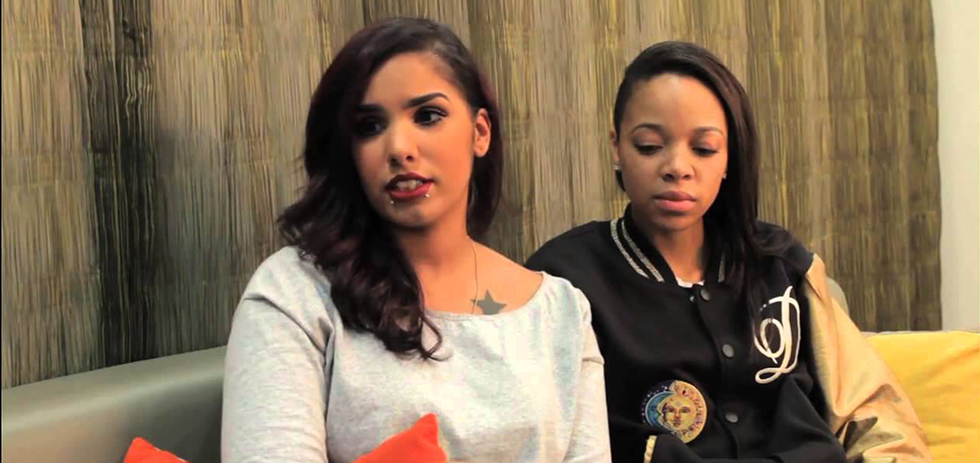
I got that vibe in the interview with the two white women, where one is asking, do you feel betrayed [by the possibility of her sleeping with men, as well as women, while presenting masculine] and the other woman admitted that she did, and it was quite noticeable that she was admitting it, whereas in the scenes of interactions between a lot of the black lesbians confronting each other, it was, ‘you’ve already been saying this about me, I know that’s how you feel.’
Right.
Now this question – I don’t know if it’s a bit of a reach, let me know if it is – but when I was watching King Kellz really struggle with how she wears her hair and wanting to wear it in a weave and copping a lot of bullshit for that, I was struck by how obviously how black women wear their hair – if you wear your hair in a weave or not, or if it’s natural or not – that’s an issue for black women across the board, not just lesbian black women. So what your hair signifies is a thing for most black women, but then in the lesbian community King Kellz has to deal with it twice: not just what her hair signifies outside the community, but also within the community. That sort of multilayered tension, do you think that’s representative of broader dynamics?
Yeah, I mean, it absolutely is. There’s women who are part of the heterosexual community and wear weaves, and men don’t like their women wearing weaves. It’s seen as something negative, and there’s this whole natural hair movement with liking to wear their natural hair and not changing it and stuff like that. But really in the lesbian community, it’s really worse, because it’s like, if you’re a masculine woman who wants to add extensions to your hair, then it’s a feminine thing. So it’s like to them, girls do that. Kellz is like, ‘but I am a girl.’ Kellz goes through so much, cos Kellz also has a really deep voice, so the deep voice with the hair, with the dancing – plus she had a baby [One of the rules in the film is ‘No pregnant studs] – people just really get upset. People really get upset. They either really get upset, or they really love her. But it’s good to show her in the film cos it also shows us that when you judge people based on what they do, how they look, how they sound – when you actually get to know a person the things that you initially thought, that’s not even who they are. That’s not even close to who they are. People assume a lot of stuff about Kellz and then you meet her, and you realise she’s one of the most wonderful people I’ve met. She’s a wonderful human being, she’s great, she’s nice, she doesn’t drink, she doesn’t smoke, there’s so many things that you wouldn’t know about Kellz, she’s a great mum, amongst other things. But people wouldn’t even take the time to get to know that based on what her occupation is, or how she chooses to present. I respect her a lot cos she’s really strong in herself, and confident, being so different in so many areas.
I really loved how you finished the film actually, Kellz talking about her self-pride, and I thought it was quite an optimistic ending with that, the upbeat soundtrack. Is that optimism reflective of how you feel yourself? Is the film you pushing forward with the community?
Um… yes. I believe is it a form of optimism on my behalf, because I believe we can change. I believe that if you reinforce positive behaviour over time things change, and they don’t happen overnight. But I think that the positivity and the optimism comes from the women who are being discriminated against being liberated. That’s where the optimism comes from. It doesn’t mean that the community is changing right now, right this second, but Kellz changed. Jordan changed. They all grew. Even though they were strong, they were concerned. But they faced people face to face and helped liberate someone else by allowing someone to watch them. So that’s where the optimism came from. Just like, one more person is stronger today; lets make that be one more person.
Do you get people responding to you saying it changed how they feel, people who watched the film?
Yeah, absolutely, a lot of people felt the same ways as some of the people discriminating. A lot of people didn’t know they felt ways towards it til they seen it on screen and they were like, ‘wow.’ A lot of people changed after the film. Like when the film’s over, no one ever just leaves. People pretty much stand around in the lobby, flood it, talk about it, or they come up to me and tell me stories on stories on stories about how they felt. So people are really passionate. If you ever sit in the room while the film is on, people are very interactive with the screen the entire film. Top to bottom, people react.
I read an Autostraddle piece about the film, and the author, Carolyn Wysinger, was saying like, ‘I yelled at the screen when the rules came on, I yelled at all the rules I disagreed with,’ which I thought was great.
Yeah, so true. People scream, cry, yell, laugh, a lot. A range of emotions. I wanted people – I didn’t want it to be another documentary that was like, ‘OK, when do we get to the point?’ I wanted people to stay locked in and keep beating the same horse over and over again. It’s like repetition. If the teacher teaches you something, if they say it once and it’s really wordy, you don’t retain it – it’s just like whatever. But if someone says something over and over and over again, in different ways, then you get it. After the repetition. So that’s why I formatted that way, so people can be entertained as well as informed and they can not feel like this is taking forever.
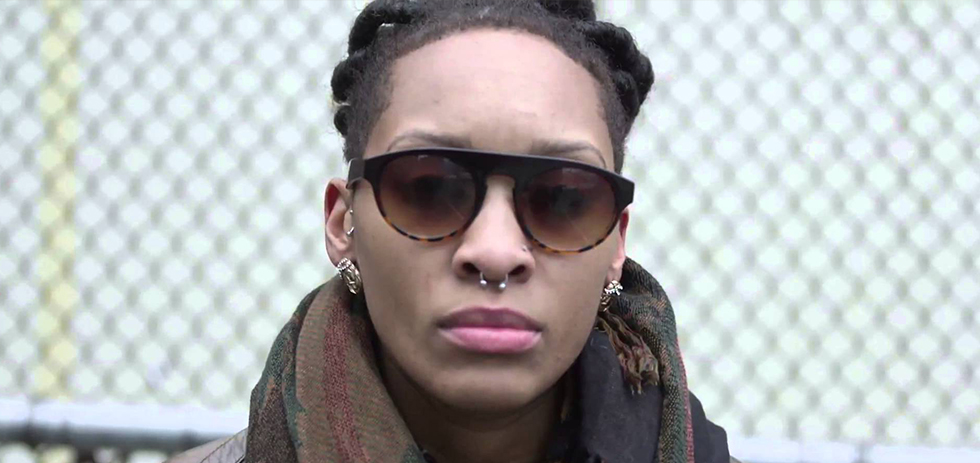
I feel like the film is operating on two separate levels. And one is that is a documentary that kind of shows this community, and a picture of this community to outsiders, and it’s quite accessible. But the other is, it’s an internal dialogue. I feel like that’s reflected in how sometimes you have the talking heads just explaining things, explaining their experiences, and then you also have the scenes of internal confrontation like Jordan on the phone. Did you intend to try and balance those two sorts of audiences, and those two modes of engagement?
Yeah, I wanted to make sure people who had no clue about this community, that they were able to understand language – which is why we broke down the different types of studs. That’s not even all of them. I feel like I need to do a part two just because there are so many, the labels are endless. I tried to get the main ones into people’s heads so they can follow along with the conversations and kinda put things into perspective. So I did think it was important to explain a lot for people who didn’t. I didn’t initially just do this for internal, I was thinking external when I did it. It’s just that people inside of the community haven’t had representation before in this way, so they’re just definitely in. I wanted to gravitate towards people who know nothing about it.
I also wanted to ask a little bit about the future of the film to wrap things up. Do you have a distributor? You said networks – are you thinking TV? More festivals?
My plan is to continue to tour internationally. I’m actually signed to Women Make Movies. I’m looking for an international distributor right now but in North America, Women Make Movies is my representation. They’re gonna be launching and explaining everything with DVDs, educational, pretty soon. I’m going to tour in the US around Pride season. We’re trying to get an air date as soon as possible, so my team in North America is also working on this but its important that we want to get it overseas too, out here, so people can have it easily accessible. So we’re working on that now. Teaching master classes on how to do what I did. I’m working on my next two films right now and touring.
What are your next two films?
One is gonna be a surprise, the trailer is going to come out April 1st on my Instagram – @nikes_nae – and I’ll put it on the @thesamedifferencedoc too, so that people who follow that film can see my next one. But it’s something that no one would expect from me. So I’m really excited about that trailer. And then another one I’m doing on a young girl who wants to enter into the Special Olympics. So the idea is to tell stories that haven’t been told, and give a voice to the voiceless. Everything’s under Nneka Productions, and I want people who are often overlooked to have a voice in the mainstream media, to educate people and to help liberate different types of subcultures. So you’ll see a lot of different cultures that get overlooked all the time in the forefront. That’s what I’m going to be pushing. Every film, I’m gonna do five, and then move on to different types of films, but I’m gonna do five.
Five docos?
The one the Special Olympics is gonna be fiction, but the rest will be documentaries so I wanna continue to give documentaries. I love things being real, I like things to hit home, I like things to be in your face. And I love the activism, it contributes to who I am, I want to help people. And this is the way to help them, to give them visibility, to help educate people who don’t have access to being educated about these things, maybe they’re never around them.
That sounds great. That’s about it for my questions unless there’s anything else you wanted to add.
Nope, just follow The Same Difference, you can find everything: screenings, interviews that we’ve done, and that we’re going to do, pictures from festivals. Like The Same Difference Documentary on Facebook and you know, I hope to be back in Australia soon, Melbourne and Brisbane, other places.
Thank you so much for your time.
No problem.
